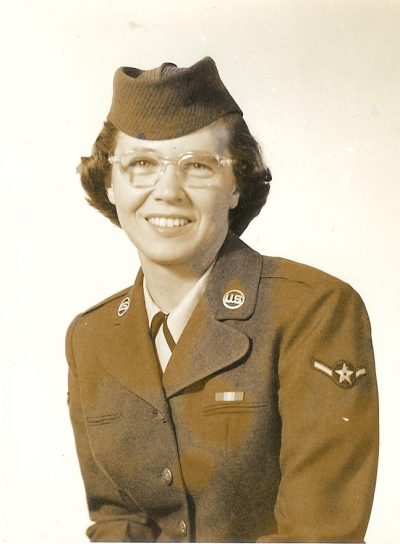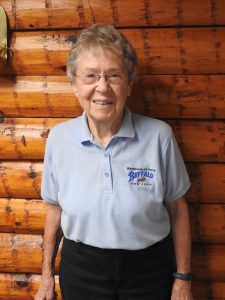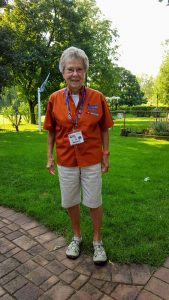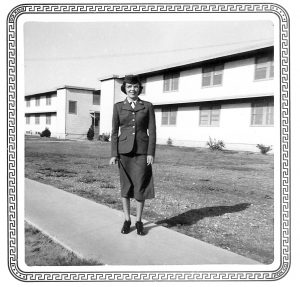A view of a changing world through the camera lens

Jo Ann Newkirk’s life began in Hamilton, Ohio, in the early 1930s and transcended almost 90 years to include a military career, ultimately leading her to Rochester, New York. Jo Ann grew up during America’s most severe economic era during the Great Depression and World War II. Jo Ann’s mom raised her and her sister on her own during this challenging time when very little was taken for granted.
“Growing up, we needed stamps to buy meat, sugar, and shoes,” Jo Ann said. The government issued ration stamp books to Americans monthly. They contained removable stamps for goods on rationed items such as sugar, meat, cooking oil, and canned goods, as well as certain types of clothing. Jo Ann chuckled, “We ate a lot of Spam and Sweet Bread, we hated it, but we would never dare to complain.” Sweet Bread is the cooked liver or pancreas of a cow. Jo Ann remembers walking six blocks during her lunchtime from school with her sister to go home and cook a meal for her mom, who was working multiple jobs and making many sacrifices to provide for her daughters. As Jo Ann was preparing to graduate from high school, she wanted a new pair of sandals to wear to graduation. She remembers learning that the family did not have shoe stamps to get new shoes, so she had to borrow a pair from her aunt.

Although Jo Ann was born during a time when women were not able to enlist directly in the Air Force, that changed when she was a teen. In 1948, President Truman signed the Women’s Armed Services Integration Act that allowed women to enlist directly in the military. That same year the US Air Force let the first female member into its ranks. Several years after this Integration Act passed, Jo Ann was out of high school and working in the paper manufacturing industry at Champion Paper. “I was living at the YWCA and did not want to spend the rest of my life running a calculator,” she said.
This was during the time of the Korean Conflict, and she had some friends enlisting in the Air Force. After meeting with a recruiter, she enlisted at the age of 24. Jo Ann had hopes to be a photographer in the Air Force. She tested high in dexterity and qualified for the military occupational specialty (MOS) as a photographer. Jo Ann completed her basic training in San Antonio at Laughlin Air Force Base and then went on for advanced training in photography and film school in Denver, Colorado, at Lowry Air Force Base. Jo Ann was stationed at Eglin Air Force Base in Florida. She spent the majority of her active duty time at this base as a photographer, working in film developing, and on highly classified radar monitoring and photography.
She became the manager of the base Air Force Women’s Softball Team and traveled with the team to different states and countries during tournaments. Jo Ann was the manager and photographer when the team went to Worlds and defeated Wiesbaden in Germany.

As Jo Ann was nearing the finish of her active duty enlistment, her Colonel helped advise her on her next chapter. “Go to Rochester,” the Colonel said. In her years of photography in the Air Force, they primarily used Kodak products. Kodak was where Jo Ann’s Colonel suggested she go for her civilian career, as they were the pioneers in innovation and development of camera-related products.
Jo Ann got an interview at Kodak Park and was hired immediately in the Research Labs. In 1957, Jo Ann moved to Rochester and became a reservist at the Westover Air Reserve Base in Massachusetts as part of their photographic group. She continued as a reservist until 1961 while working full time at Eastman Kodak. During Jo Ann’s years at Kodak, she worked in research, product development, processes, testing of both consumer and professional films, and emulsion research. During her final years at Kodak, Jo Ann was working on a new technology of x-ray film that allowed x-rays to show the front and back views. Jo Ann recalls, “The film was first tested by a doctor who used the new film on his wife when he did a lung X-ray. The testing of this new technology led to discovering his wife had lung cancer.” This film is now marketed under the brand name Insight. Jo Ann retired from Kodak in 1991.
After retiring from the Air Force, Jo Ann stayed active in veteran programs. She was a member of the Florence Nightingale Legion, an all-female unit of the American Legion that was started in Rochester by former servicewomen in 1919. The post was active in charitable work for children and supportive of veterans and their families. Jo Ann is still active in the Women in Air Force organization, a national group of retired female airmen who joined between 1949 and 1976. The group was founded in 1948 as part of the Women’s Armed Services Integration Act, trailblazing initiatives for female service members, including networking and career advancement support. The organization advocated for expanded roles for women until 1976, when women were finally accepted with equal footing with men.
In 2010, Jo Ann was selected to be part of the Mission 46 Honor Flight. She was the only woman of the 45 who traveled to Washington, DC for a two-day trip that included visiting the monuments, meals, and an honorary dinner. A homecoming greeting of a fantastic crowd of adults, children, and bands overwhelmed Jo Ann. “It brought me to tears,” she said. After her emotional experience, she said, “I need to volunteer!” Jo Ann is now an active volunteer for Honor Flight; she helps with the greeting committee and charity events such as the golf tournaments and motorcycle runs.
Jo Ann settled on Rochester’s west side in Ogden. She built her home there in the early 1960s and has been part of the civilian and veteran community for many decades. “My life here has been wonderful,” she said. Beginning life during a time of historic struggles, sacrifices, and poverty instilled deep values of hard work, loyalty, and appreciation for Jo Ann. Seeing how hard her mom worked, and the challenges she overcame, formed Jo Ann’s values and desire to challenge herself to try new things. “The military really helped me grow up and feel like somebody. Putting on a uniform really felt good and made me want to try things I did not think I could do,” she said.

During Jo Ann’s lifetime and experiences, she has seen many changes in the world. She started life during a historic time of scarcity that evolved into what she witnesses today. She recalls many contrasts – sitting on the front porch as a child and hearing her grandparents comment on how busy the roads were because two cars were driving at one time; and growing up when airline travel became popular for consumers, and the first airports were being opened. And the unimaginable transition of photography, from 35mm black and white film to digital imaging. During Jo Ann’s lifetime, transcending over nearly nine decades, she has seen some of the most amazing moments in American history. She had the opportunity to go back to her first base in San Antonio to see the changes in the past 50+ years. There were improvements in the barracks, “Chow Hall” no longer had KP (Kitchen Police) but civilians serving food, and the expansive PX store (Post Exchange) now carries everything.
Her fondest visit to her past came when she went back to visit her grandparents’ house, a house where she spent many summers. It was still there, and the owners allowed her to come in. She ran her hand down the banister as all the nostalgia of her childhood memories of a very different era filled her heart as quickly as the tears flooded her eyes. Jo Ann still resides at her home in Ogden, and she reflects on her life, her military experience, and the path it led her to, with all the opportunities and experiences. She illuminates with gratitude, “I would not have traded one day of this.”

